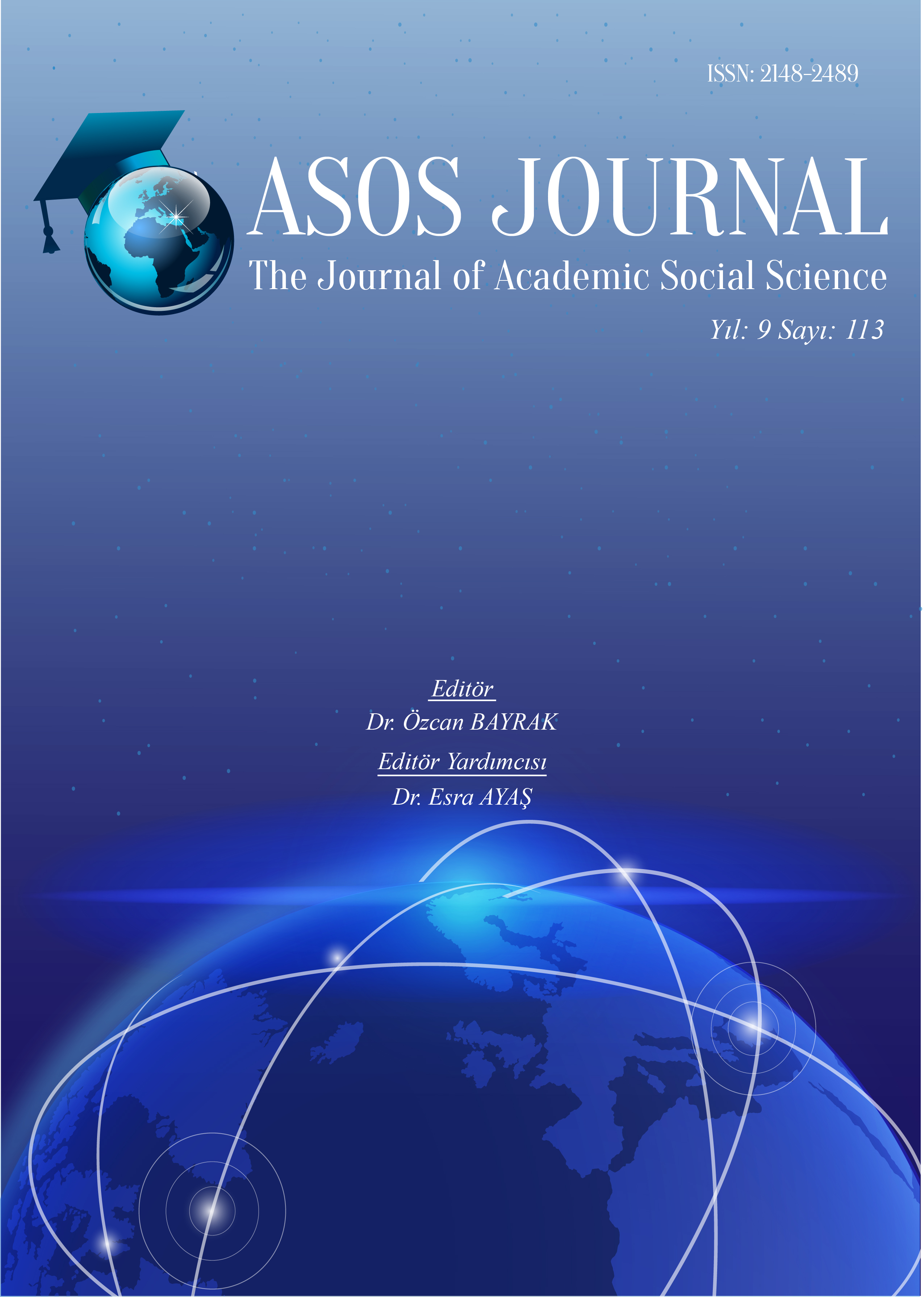Author :
Abstract
Amaç: Bu araştırmanın amacı, bir il merkezinde yaşayan kadınların toplumsal cinsiyet rollerine yönelik tutumlarını ve bu tutumları etkileyen faktörleri belirlemektir.
Yöntem: Kesitsel tipteki bu çalışma, Türkiye'nin doğusunda yaşayan 800 kadın katılımcı ile gerçekleştirildi.
Bulgular: Kadınların Cinsiyet Rolü Tutum Ölçeği (CRTÖ) toplam puan ortalaması 116.46±13.23 olarak belirlenmiştir. Araştırmada evli kadınların, kendisi ve eşi okul eğitimi almamış olanların, kendisi ve eşi çalışmayan kadınların, eşiyle akrabalık bağı olanların, en uzun süre köyde yaşayanların ve geniş aile yapısında yaşayan kadınların CRTÖ puan ortalaması anlamlı düzeyde düşük bulunmuştur (p<0.05).
Sonuç: Sosyal hayatta kadın erkek eşitliğini sağlamak ve kadının sosyal statüsünü yükseltmek için kadınların eğitim seviyesinin yükseltilmesi gerekmektedir.
Keywords
Abstract
Purpose: The aim of this study was to determine the attitudes of women living in city center towards gender roles and factors influencing these attitudes.
Methods: This cross-sectional study was conducted with 800 female participants who were living in the province in Eastern Turkey.
Findings: Mean scores of the Gender Role Attitude Scale (GRAS) was calculated as 116.46±13.23 points. The mean GRAS scores of women married, illiterate, having illiterate spouses, unemployed, having unemployed spouses, and who had extended family type were comparatively lover.
Conclusion: To ensure equality between women and men in social life and to increase the social status of women, it is necessary to raise the educational level of women.
Keywords
- Altın, A. (2018). The Relationship between gender role attitudes and peer pressure experiences among students of the Faculty of Health Sciences. Master’s Thesis. Ondokuz Mayıs University, Institute for Health Sciences, Samsun.
- Altuntaş, O., and Altınova, H. H. (2015). Toplumsal Cinsiyet Algısı İle Sosyo-Ekonomik Değişkenler Arasındaki İlişkinin Belirlenmesi. Turkish Studies (Elektronik), 10(6), 83100.
- Atış, F. (2010). Determining the Attitudes of 1st and 4th grade students in midwifery/nursing regarding gender roles. Master’s Thesis. Çukurova University Institute for Health. Sciences, Adana.
- Aydın, M., Bekar, E.O., Gören, S.Y., and Sungur, M.A. (2016). Nursing students' attitudes toward gender roles. Abant Izzet Baysal University Journal of the Institute for Social Sciences, 16(1), 223-242.
- Aylaz, R., Güneş, G., Uzun, O., and Ünal, S. (2014). The views of university students on gender role. STED, 23(5), 183-189.
- Balkır, Z.G. (2012). Gender and gender discrimination. TUBAKKOM, 1, 68-94.
- Baxter, J., and Kane, E.W. (1995). Dependence and independence: a cross-national analysis of gender inequality and gender attitudes. Gender and Society, 9(2):193-215. http://dx.doi.org/10.1177/089124395009002004
- Bedük, A. (2005). Worker women and entrepreneurship in Turkey. Electronic Journal of Social Sciences, 3 (12), 106-117.
- Çelik, A.S., Pasinlioglu, T., Tan, G., and Koyuncu, H. (2013). Determination of university students’ attitudes about gender equality. Florence Nightingale Journal of Nursing, 21(3),181-86.
- Çıtak, A. (2008). Attitudes for women’s work: a comparison according to sex, gender roles and socioeconomic status. Master’s Thesis. Ankara University Social Science Institute, Ankara.
- Çiçek, B., and Çopur, Z. (2018). Bireylerin Kadınların Çalışmasına ve Toplumsal Cinsiyet Rollerine İlişkin Tutumları. International Journal Of Eurasian Education And Culture, 3(4), 1-21.
- Darakchi, S. (2018). Gender, religion, and identity: Modernization of gender roles among the Bulgarian Muslims (Pomaks). Women's Studies International Forum, 70, 1-8.
- Direk, N., and Irmak, B. (2017). Dokuz eylül üniversitesi tıp fakültesi öğrencilerinde toplumsal cinsiyet rollerine yönelik tutumlar. DEÜ Tıp Fakültesi Dergisi, 31(3), 121-128.
- Esen, E., Soylu, Y., Siyez, D. M., and Demirgürz, G. (2017). Üniversite Öğrencilerinde Toplumsal Cinsiyet Algısının Toplumsal Cinsiyet Rolü ve Cinsiyet Değişkenlerine Göre İncelenmesi. e-International Journal of Educational Research, 8(1), 46-63.
- Fan, L.P., and Marini, M.M. (2000). Influences of gender–role attitudes during the transition to adulthood. Social Science Research, 29:258-283.
- Gere, J., and Helwig, C.C. (2012). Young adults’ attitudes and reasoning about gender roles in the family context. Psychology of Women Quarterly, 36(3), 301-313.
- Gök, E., Aydın, B., and Weidman, C.J. (2019). The impact of higher education on unemployed Turkish people’s attitudes toward gender: A multilevel analysis. International Journal of Educational Development, 66, 155-163.
- Gökcan, M., and Kavas, A. B. (2018). Meslek seçiminde toplumsal cinsiyetin rolü: Bir ölçek geliştirme çalışması. Kariyer Psikolojik Danışmanlığı Dergisi, 1(1), 48-67.
- Güzel, A. (2016). Öğrencilerin Toplumsal Cinsiyet Rolleri Tutumları Ve İlişkili Faktörler. Gümüşhane Üniversitesi Sağlık Bilimleri Dergisi, 5(4), 1-11.
- Inglehart, R., and Norris, P. (2003). Rising tide: Gender equality and cultural change. Cambridge, England: Cambridge University Press
- Karasu, F., Göllüce, A., Güvenç, E., and Çelik, S. (2017). The attitudes of the university students' regarding the gender roles. Süleyman Demirel University Journal of Health Science. 8(1), M21-27.
- Kurşun, E. (2016). Determination of public gender role attitudes of staff in Samsun Public Health Directorate. Master’s Thesis. 19 Mayıs University Social Sciences Institute, Samsun. 2016.
- Lips, H.M. (2017). Sex and gender: An introduction. Waveland Press.
- Oakley, A. (1972). Sex, gender and society. London: Temple Smith.
- Oktik, N., and Reşitoğlu, H.Ü. (2018). Aileyi Anlamak- Disiplinler arası yaklaşım. Ankara: Nobel Akademik Yayıncılık
- Özaydınlık K. (2014). Women in Turkey on the basis of gender and education. Journal of Social Policy Studies. 4(33):93-112.
- Pekel, E. (2019). Toplumsal Cinsiyet Rolleri ve Kadının Çalışma Hayatındaki Konumu. Balkan ve Yakın Doğu Sosyal Bilimler Dergisi, 5, 30-39.
- Savaş, G. (2018). Türkiye’de yaşayan bireylerin toplumsal cinsiyet eşit (siz) liği algısı. Akdeniz Kadın Çalışmaları ve Toplumsal Cinsiyet Dergisi, 1(2), 101-121.
- Sümbüloğlu, K., and Sümbüloğlu, V. (1997). Biyoistatistik. (pp.218-238). Ankara: Hatipoğlu Publisher.
- Vefikuluçay, D., Zeyneloğlu, S., Eroğlu, K., and Taşkın, L. (2007). Perception of and views on gender roles of senior students enrolled at Kafkas University. Journal of Hacettepe University Faculty of Nursing, 14(2), 26-38.
- Women, U. N. (2017). Understanding masculinities, results from the International Men and Gender Equality Study in the Middle East and North Africa.Campbell C. Horowitz J. Does college influence sociopolitical attitudes? Sociology of Education. 2016; 89 (1):40–58. http://dx.doi.org/10.1177/089124395009002004
- Yılmaz, S. (2018). Toplumsal Cinsiyet Rollerinin Günlük Hayattaki Yansımaları: Çorum/Alaca Örneği. İmgelem, 2(2), 59-79.
- Zeyneloğlu, S. (2008). Attitudes toward gender roles of nursing students in Ankara. Ph.D. Thesis. Hacettepe University Institute for Health Sciences, Ankara.
- Zeyneloğlu, S., and Terzioğlu, F. (2011). Development and psychometric properties gender roles attitude scale. Hacettepe University Journal of Education, 40, 409-420.
